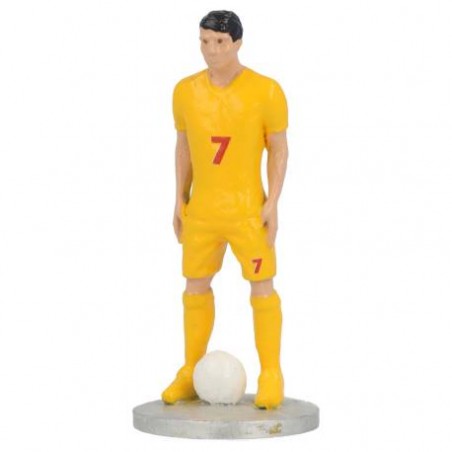




Miniature football player with kit of the national team of Romania.
Our football players are casted in metal, and afterwards painted with care and sense for detail. Also discover our other football players.

Pay safely

Fast delivery

Return & Refund
The Romanian national football team was at times considered one of the strongest teams in Europe in the 1990s. Although Romania had already participated in the first three World Cups (1930, 1934, 1938), it was not until the 1990s that it was able to cause an international stir. Romania's Footballer of the Century Gheorghe Hagi was particularly responsible for the national team's rise in performance. With him as playmaker, the team qualified for the World Cup three times in a row (1990, 1994, 1998) and for the European Championship twice (1996, 2000). At the 1994 World Cup, the Romanians defeated Argentina to reach the quarter-finals. There, however, the team was defeated by Sweden in a penalty shoot-out.
Although the Romanian Football Association was founded in 1909, it did not join FIFA until 1923. The first official international match took place the year before, on 8 June 1922. Yugoslavia were beaten 2-1 in Belgrade. In 1924, a Romanian team took part in the Olympic Games in Paris, losing to the Netherlands in the round of 16.
Romania participated in the first three World Cups in 1930, 1934 and 1938, but was always eliminated in the first round. In 1930, Romania finished second in their group. They lost the decisive group match against the future world champions Uruguay. In 1934, they lost 2-1 to Czechoslovakia, the eventual runners-up, in the round of 16. Four years later, Romania lost to Cuba in the round of 16 in a replay after the first match ended in a draw after extra time.
After the Second World War, a Romanian selection took part in the 1952 Olympic Games in Finland, but was eliminated by Hungary in the first round. After that, Romania rarely qualified for the major football tournaments. At the 1964 Olympic Games in Tokyo, they reached the quarter-finals. At the 1970 World Cup, Romania lost 0:1 to the reigning world champions England and 2:3 to the later world champions of that tournament, Brazil. In 1984, Romania qualified for the European Championship for the first time. In France, however, they were eliminated as the last team in their group.
During the 1990s, the Romanian national team led by Gheorghe Hagi achieved its international breakthrough. Alongside him, important players such as Gheorghe Popescu, Dan Petrescu, Dorinel Munteanu and Ilie Dumitrescu left their mark on the team. Right at the beginning of the decade, they were present under Emerich Jenei at the World Cup in Italy, where they were defeated by Ireland in a penalty shoot-out in the round of 16. After a brief slump and failure in the following European Championship qualifiers, they returned to the international stage under Anghel Iordănescu. At the 1994 World Cup in the United States, the 45-year-old coach's team played itself into a frenzy and advanced to the quarter-finals. The match against Argentina in the round of 16 caused a sensation. In a brilliant game, the Romanians beat the reigning runners-up 3:2 in a match that was to be voted the best of the tournament. In the following match against Sweden, they were forced to concede an equaliser towards the end of extra time due to a goalkeeping error by Florin Prunea. After a miss by Miodrag Belodedici in the ensuing penalty shoot-out, the Iordănescu eleven's course in the USA ended in the quarter-finals.
The subsequent European Championship in England was reached, but Gheorghe Hagi's eleven disappointed completely and was eliminated as group last with 0 points. Two years later, the team performed much better at the World Cup in France and reached the last 16, where they lost 1-0 to an up-and-coming Croatian team. The ageing golden generation was able to celebrate a successful conclusion at the following European Championship in 2000 in Belgium and the Netherlands.
After Victor Pițurcă led the team to the European Championship, he had to pack his bags due to disputes with superstar Gheorghe Hagi. He was replaced by Emerich Jenei, who led his team to defeat both England and Germany in the quarter-finals, only to be beaten 2-0 by eventual runners-up Italy.
In the following years, the Romanian team was unable to build on these successes: Despite outstanding players such as Cristian Chivu and Adrian Mutu, they narrowly failed to qualify for the 2004 European Championship against Norway and Denmark; Romania also failed to qualify for the 2006 World Cup finals. In 2008, the team won its group in the European Championship qualifiers, but then failed to qualify for the preliminary round of the tournament. The team again failed to qualify for the 2010 and 2014 World Cup finals. For the 2016 European Championship, qualification was achieved, but the team failed in the preliminary round. After that, Christoph Daum was coach until 2017, the first coach from abroad after Josef Uridil (1934).
Data sheet